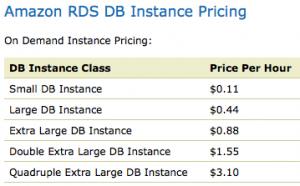Next week at the PASS Summit, I’m presenting a session called “Yes, I’m Actually Using The Cloud.” I’ll be talking about what’s out there, why I use it, and why you might want to use it too.
Brendan Cournoyer of SearchSQLServer.com interviewed me recently about the topic and asked questions like:
- For those who are relatively unfamiliar with cloud computing, what is the case for cloud-based databases? Is it all about performance?
- Aside from questions about security, what are some other reasons why folks might be hesitant to deploy cloud databases?
- What about other cloud database options? Relational databases in the cloud are rare. From a SQL Server perspective, how does Azure compare to the other options that are available?
You can read my answers in the interview at SearchSQLServer.
Amazon RDS: New Azure Competitor
Today, Amazon announced a new competitor to SQL Azure: Amazon Relational Database Service. It’s got some compelling advantages:
- It’s basically MySQL with some added goodies. If you already know and love MySQL (I don’t know it well, so I don’t love it – yet), it’s easy to love RDS.
- Amazon handles basic management. They do patch management, backups, restores, and export performance statistics to Amazon CloudWatch for free. To some extent, they’re providing production database administration as part of the cost.
- It leverages Amazon’s storage for snapshots. You just tell Amazon how many days of history you want to keep, and they handle it for you without you understanding anything about recovery.
- Coming soon: high availability with replication. You’ll be able to replicate your MySQL databases between Amazon’s different datacenters without a fancypants database administrator.
If I was a MySQL production DBA, you’d hear my eyebrows raising. I’d be worried about my long-term job prospects. From here, it’s a race to the bottom. Suddenly there’s a service out there that provides some of the same functionality that production DBAs provide, except it’s available by the hour.
What’s the Cheapest Way to Solve a Problem?

If I was the project manager for an app with a MySQL back end, you’d hear my sigh of relief. If I could move my app to Amazon RDS, suddenly performance issues have a completely different solution. I could either pay a MySQL DBA to find the root cause, or I could simply choose a faster/stronger/better Amazon instance size.
A “small” instance is 1 core with 1.7GB of memory.
A “quadruple extra large” instance is 8 cores with 68GB of memory.
The price difference between these two is roughly $3 per hour.
How much do you think a MySQL DBA costs? It’s gotta be more than that. Why would you pay a DBA if you can simply ramp up hardware capacity? Now, of course as DBAs, we know that model doesn’t scale forever. You can still run into performance problems at the Quadruple Extra Large instance level, but project managers will gamble that their apps will still survive long enough for Amazon to introduce faster instance power.
The Best Kind of Cloud Service
This is my favorite kind of cloud service. It’s not vendor-specific, so you can build your app with a MySQL back end without committing to using Amazon RDS. If Amazon pulls the plug on RDS next year, no biggie – you can still run it on any hosted MySQL service. You can’t do that with Amazon SimpleDB, which is proprietary. Even better, Amazon RDS is full-blown MySQL, not hobbled in any way.
SQL Azure falls into an odd niche, because you can develop for it without worry. If Microsoft pulls the plug on Azure, you can still use your app with “real” SQL Servers, because Azure is just a crippled SQL Server implementation. (That’s a good thing and a bad thing.) However, if Azure dies off, you’re stuck with moving to SQL Server, not exactly the cheapest solution around. Microsoft offers free-for-a-while licensing with BizSpark and WebSpark, so you can at least buy time, but sooner or later you’re going to face licensing costs.
I love announcements like this because I see it as an exciting time to be a solutions provider. Like I blogged yesterday, DBAs are always consultants, and we need to view ourselves as providing a service. Amazon RDS, like other tools, is something that can either compete with us or be part of our toolset. Figure out how to use it as part of your skillset, or else you risk getting displaced by it.


8 Comments. Leave new
I’ve got to say this seems a bit scary as a new DBA. What can I offer to a company that isn’t covered, cheaper, by systems like this. I don’t have the whole “years of experience” thing to help me out. Still an exciting development.
I think people worry too much about the future of DBAs. We’re ingenious people, we’ll find ways to make ourselves indispensable. Failing that, surely Amazon and their ilk will need DBAs? Maybe I need to change my medication.
Hi – Is there any training or orientation sort of classes for DBA’s to work on Cloud?
MySQL
Oracle..
Cheers – thanks.
Brendon – right now, every cloud platform is wildly different, so you want to pick a platform first before you work on training. Then check out the help forums, discussion groups, http://stackoverflow.com, and http://serverfault.com looking for information about your particular platform. Check with the power users for each platform, and see if they know of consultants offering private training. Right now, I gotta be honest, it’s pretty darned hard to find good info on the cloud because it’s changing so fast. The folks on the cutting edge are adapting and building products rather than building training platforms.
Thanks a bunch Brent [of]Oz.
Appreciate your reply.
And also enjoyed reading your travel blog.
Cheers.